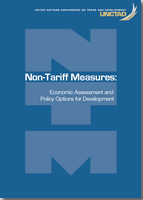
One of the main features of the international cooperation agenda during the last 50 years has been to promote the economic integration of poorer countries into the global economy, helping them to eradicate poverty and achieve prosperity. This proposition, at the core of the UNCTAD mandate, has recently been forcefully reinstated in the United Nations 2030 Agenda for Sustainable Development and in the Sustainable Development Goals (SDGs).
SDG 17 calls for the strengthening of the means of implementation, including through international trade, and the revitalization of the global partnership for sustainable development. The rationale is that stronger economic integration will enhance economic growth, reduce poverty, and ultimately develop the resources needed for sustainable and inclusive prosperity.
Although economic integration has been an integral part of the agenda for five decades, many countries still struggle to integrate into international markets. One problem is that contemporary economic integration strategies need to confront policy measures that are well beyond the scope of traditional trade policy. For example, developing countries’ effective participation in world markets depends on their capacity to satisfy technical and quality standards, as well as to comply with administrative procedures. As this book shows, all these policies measures, generally referred as non-tariff measures, have a profound impact on the structure of global trade and participation of countries therein.
The fact-based contributions herein provide a solid overview of the evolving role of non-tariff measures in the multilateral policy framework and how these measures affect development strategies. The need for this publication is based on the belief that good policy needs to be backed by good analysis. This publication provides an overview of analytical tools for the assessment of how non-tariff measures impact socio-economic development. It utilizes much needed case studies from researchers in developing countries.
The publication is part of the ongoing effort by UNCTAD to help better understand the full range of implications of trade policy for socio-economic development. As all countries are designing road maps on how best to achieve the SDGs, an improved understanding of the role of non-tariff measures will be necessary to support the role of trade as a means of implementation of the SDGs. These are matters of interest to all member States. I very much believe that the contributions in this publication are a step in this direction.

Secretary-General of UNCTAD



